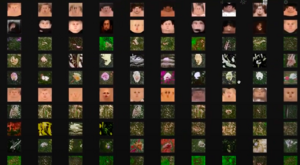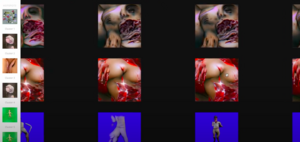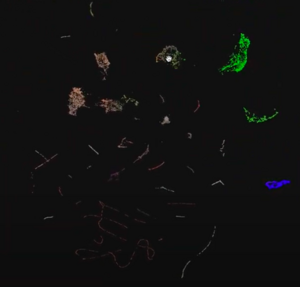Counterculture has always functioned as a means to envision non-hegemonic futures. However, we have been seeing how phenomena like grunge, techno, or queer movements have succumbed to capitalism's ability to commodify them into commercial content. Is it possible to imagine something non capitalizable? The mediaeval mystic definition of imagination as "thinking with images" has evolved into a contemporary understanding as "the capacity to represent possibilities other than present possibilities" (Picón, et al., 2024). Therefore, a deficiency in imagination is correlated with image generation and a lack of potential alternative futures (Fisher, 2016). In the era of crowd-generated imagery and automated cognition, the question arises: what form would counterculture assume?
AI models, designed to generate images akin to their training dataset, contribute to the homogenization of datasets. This trend is pervasive in the contemporary technological landscape and is identified as a primary cause of cultural biases. Technical and social attempts to rectify biased or incomplete data, such as the unlearning machine (Nguyên, et al. 2024), have proven unsuccessful. Conversely, artists like Mimi Onuoha or Caroline Sinders propose the use of datasets to identify underrepresented identities, resulting in their research: missing datasets or feminist dataset. Acknowledging the impossibility of seeking an impartial data, these two researchers leverage the potential of datasets to an artistic format capable of subverting capitalist practices.
Similarly to the missing datasets, the concept of the Weird serves as an ally in recovering what is absent, repressed, forgotten, or ignored (Fisher, 2018). This includes entities deemed as “monster” originating from "monere," signifying the manifestation of aspects that society tends to avoid, thereby neglecting intrinsic revelations. In its semantic family the term "xeno", referred to the alien, the other, and recovered by the Xenofemisnists (Hester, 2018) gains significance due to its lack of classificatory criteria.
The XenoVisual Studies collective explores images generated by and for cognitive assemblages between humans, machines and the xeno (Hayles, 2017). The xenoimages they generate disrupts normative represented bodies by hacking generative protocols, repurposing tools, gathering images of xenobodies as training data, engaging in algorithmic apophenia, or creating invented languages (XenoVisual Studies, 2024). The whole co-imagining movement occurs in a collaborative environment where communities most affected by biased data meet with artists and technologists.
Subsequently, xenovisuals become operational images (Parikka, 2023), crafted by (machines) cognizers for other (machines) cognizers in the pursuit of creating new imaginaries. Unclassifiable image datasets serve as catalysts for imagining future fictions, interpreting the dataset not merely as a format or data container but as imaginal matter for cognizers.
Example images from the collective project Xenoimage Dataset 2022.



References
Fisher, M. (2016). Capitalist Realism. [Realismo Capitalista]. Buenos Aires, Caja Negra.
Fisher, M. (2018). The Weird and the Eerie. [Lo raro y lo Espeluznante]. Buenos Aires, Caja Negra.
Goh, A. (2019). Appropriating the Alien: A critique of Xenofeminism. Mute. https://www.metamute.org/editorial/articles/appropriating-alien-critique-xenofeminism
Hayles, N. Katherine (2017) Unthought: The Power of the Cognitive Nonconscious. Chicago, IL: Chicago University Press.
Hester, H. (2018). Xenofeminism. John Wiley & Sons.
Nguyên, T. T., Huynh, T. T., Nguyen, P. L., Liew, A. W., Yin, H., & Nguyen, Q. V. H. (2022). A survey of machine unlearning. arXiv (Cornell University). https://doi.org/10.48550/arxiv.2209.02299
Ọnụọha, M. (2024, 1st January). The Library of Missing Datasets. MIMI ỌNỤỌHA. https://mimionuoha.com/the-library-of-missing-datasets
Picón, D., Castro, J., & Rocío, D. (2021, noviembre). La imaginación (temporada ELR171). Recuperado 8 de enero de 2024, de https://open.spotify.com/episode/4hEYgzMJj43jN2j4Hnj8Ue?si=66eef3748744404a
XenoVisual Studies (2024, 11th January). XenoVisualStudies. https://xenovisualstudies.com/